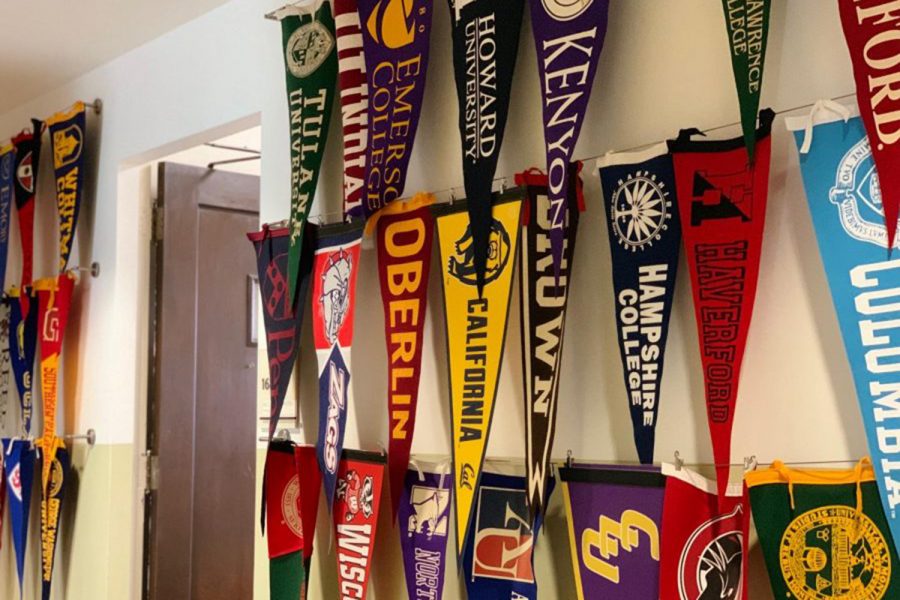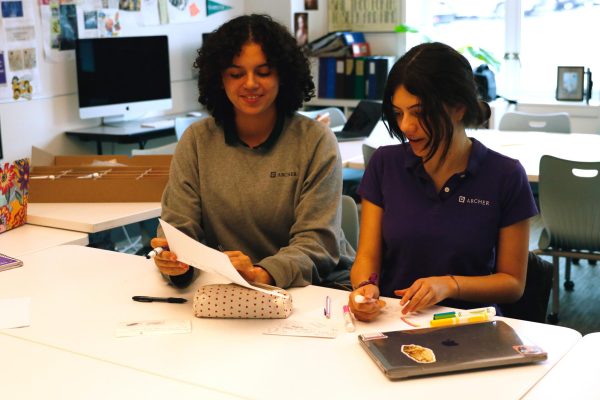Under Pressure: Juniors feel ‘immense’ stress beginning college process, ‘staying calm’ in wake of college admissions scandal
Photo credit: Molly Goldberg
College pennants from the class of 2018 hang in the downstairs hallway. Many juniors are under stress as they begin the college process.
While the college process of the class of 2019 has come to a close, members of the class of 2020 are just getting started. Though it is only the beginning, junior Kelsey Thompson said the college process for the junior class is already “demanding” and “overwhelming.”
According to an Oracle survey of Archer upperclassmen with 53 responses, 71.7% of students feel stressed or very stressed about the college process. Thompson said that the biggest source of her stress is standardized testing and keeping grades up.
“The pressure to maintain my grades while also preparing for standardized testing is completely overwhelming, and a type of stress I have never experienced before,” Thompson said. “Studying for the ACT is like a class of its own, with loads of homework and practice tests each weekend.”
Fellow junior Lauren Evans-Katz says the way that she minimizes her stress is reminding herself that everyone has a unique process and approaches the college process in a different way.
“I think it is natural that we are going to be stressed at this point, but I think the best idea is to keep the process individualized and not pay attention to what everyone else is doing since everyone is so different in this process,” Evans-Katz said.
According to Evans-Katz, Archer helps her manage her stress about the college process “really well.”
“There are some schools I know of that [that] introduce the stress of college to students at such a younger age than Archer does,” Evans-Katz said. “I think Archer does a good job of having us meet in HD and having a group setting where we are all in the situation together.”
Students begin the college process during the second semester of their junior year. Students take college guidance in place of their Human Development class, taught by Archer’s two college guidance counselors, Gabrielle Dorsey and Jee Won Lee. In this course, they learn about the many different components of the application process and explore different aspects of colleges they may be interested in. Additionally, each student gets assigned their own counselor that they meet with individually three times throughout the semester.
“We really try to emphasize balance and what’s really truly important in this process, which is not the end result,” Dorsey said. “It’s really about the process itself — figuring out who a student is and what they want in the future.”
Though Archer’s college process “emphasizes balance,” the recent college admissions scandal revealed that around the United States, this is not always the case. In March, federal prosecutors charged 50 people of conspiracy to commit mail fraud and honest services mail fraud, accusing dozens of parents of paying millions of dollars in bribes to help their children get into top colleges such as Yale University, Georgetown University, Stanford University and the University of Southern California. Fraudulent acts ranged from doctoring images of students playing sports to cheating on the SAT and ACT.
“It’s really disappointing to see parents taking away spots from kids who really deserved admission,” Thompson said. “These parents care so much about the name of the school that they want their kid to get into, even if that’s not what their kids want.”
Evans-Katz said she feels as though there have been many unethical situations within the college admission process in the past.
“When you think about it, this type of cheating has have been happening for so long and the college admissions process has been very skewed for a long time,” Evans-Katz said. “It’s scary that this happened right as we are about to apply to colleges, but part of me is also grateful because I think it will cause a shift in the way colleges handle admissions.”
The survey also showed that 26.6% of upperclassmen have cheated at least once during their high school career, and 54.7% said they have been tempted to cheat at least once in their high school career.
“The need to cheat definitely stems from competition, since grades mean the difference between getting into a dream school and a likely school. I think to alleviate the stress to constantly perform at the highest level, people turn toward cheating,” Evans-Katz said.
Additionally, 56.6% of upperclassmen say that going to a brand-name college is important to them.
“People are drawn to brand-name colleges because they don’t know anything else. When you grow up, you don’t really hear about super remote and unknown schools. So I think naturally, it’s common to want to go to a school that people recognize,” Evans-Katz said. “I definitely feel that need sometimes to go to a school that everyone knows, but after going on college tours and touring some schools that I had never heard of, I realized that some of those schools are my top choices right now. I don’t even care if people know them or not.”
According to Dorsey, in her years of working as a college guidance counselor, she has seen anxiety and stress in students increase over time.
“I think with our economy, job market and seeing how our millennials are faring, people are really worried about outcomes,” Dorsey said. “They talk about millennials stereotypically being 30 and still living in their parent’s basement or in a small apartment, and I think parents of teenagers these days don’t want that for their kids, understandably. That induces more pressure on the parents to make sure that their kid lands well, which translates into more internal pressure the kids are putting on themselves to do well.”
Dorsey also says that with the increasing selectivity of universities across America, students feel panicked and believe that they have to go to one of the most selective schools to be successful in life.
“[Students] think if they don’t [get into a selective school] they are screwed, which is of course false. This is, unfortunately, the narrative that comes out around the college process,” Dorsey said. “I wish it wasn’t, honestly. There are thousands of schools to choose from, and I think no matter how many times people say they believe us, they still have those 10 schools they are set on going to.”
Ella Frey ’19 said that it is important to have no expectations throughout the process.
“I would tell myself that everything would eventually work out,” Frey said. “When the decisions come out, it is important to keep the best attitude you can because it is ultimately out of your control.”
Thompson said that even though she is stressed, she feels that she has learned a lot as she begins this process, and she is excited to find out what her future holds.
“I’ve learned throughout this process that the truth is, any school is going to give a very similar education and there are going to be very similar opportunities at all of them,” Thompson said. “I don’t think success is being able to hold up an Ivy League flag. I think it is being able to say that you are happy.”

Molly Goldberg joined the Oracle staff in 2017 as a staff writer and was promoted Sports Editor for her junior year. This year, she is excited to fill...








